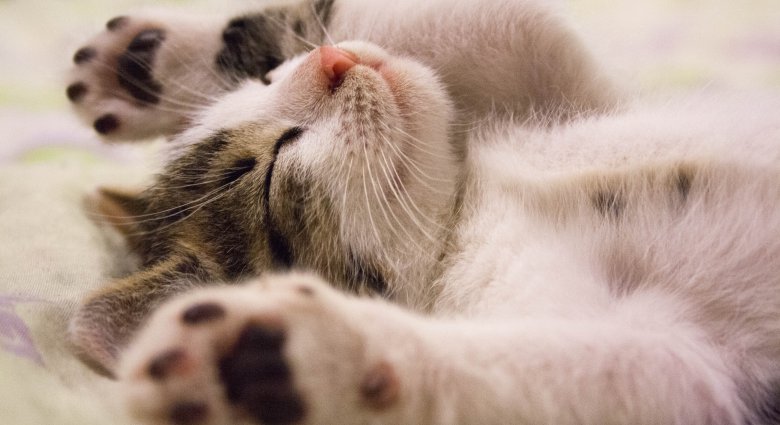
Why does your cat vomit? Learn about the most common causes and methods of treatment
Every cat owner will sooner or later face the problem of cat vomiting. This is not a pleasant situation, of course. What should be remembered then?
WHY DOES THE CAT VOMIT?
First of all, you should know that vomiting is not a sign of your pet's malice. Why do cats vomit? There are many reasons for this, but at the beginning it is worth asking yourself some basic questions:
- how often does your pet vomit - during the day or week?
- Do vomiting takes place after meals or after a walk?
- when was the last time the pet was dewormed?
- Is the cat an outgoing animal alone or not?
- Does vomiting include water, undigested food, bile, or maybe grass or hair?
- Did vomiting start or intensify after the change of karma?
- Is the cat vaccinated regularly?
- Apart from vomiting, have there been any other worrying symptoms such as diarrhoea, blood in the stool, lack of appetite, irritability or ossiveness?
- Does your cat take any medication?
The answers to this question make it easier to understand the cause of such a phenomenon. Sometimes this may herald the beginning of a serious illness.
There may be a lot of reasons for cat vomiting:
Crazy - this is a 100% natural symptom, vomiting is aimed at removing hairballs from the cat's gastrointestinal tract; vomiting may contain grass and hair swallowed during hair loss; the cat eats grass and irritates its gastrointestinal tract, causing a vomiting reflex. A part of the grass cleans the digestive tract like a brush by pushing bacilli into the intestines and rectum; when this kind of vomiting interferes with the pet's owner, you can buy food with more exfoliator, which is designed for cats with long hair. In addition, the extrusion paste works well.
THE CAT WILL BLEED
Food intolerance - your cat does not respond to food and needs to be replaced. Even high quality food may not work for your cat and needs to be exchanged for a completely different one. Vomiting most often occurs after eating and contains over-digested food often with the addition of blood.
THE CAT VOMITS AFTER EATING
Eating too fast - vomiting usually occurs immediately after a meal, because ketahs eat a lot and fast. That's how cats that were hungry in their youth and those that love to eat have it. In this case, it is worth replacing the food with one with a larger size of crumbles. The cat is then forced to chew them and cannot swallow them as a whole. In addition, special bowls for cat glow plugs can be purchased. Your pet will need to rub a little bit to get to the food. It also works well to feed smaller portions, but more often. Food must not be left in the cat's reach.
Vomiting - worms such as roundworms can sometimes be seen in vomiting. The worms in the cat's intestines feed into the metabolism with their metabolic products, irritate the intestinal walls as a result of wandering towards the lungs. Causes a feeling of choking and vomiting reflex. Outgoing cats should be dewormed every three months and domestic cats every six months.
WHERE TO GO?
Food poisoning - the cat ate something harmful that harmed him. These may be cleaning products, plants harmful to the cat, plant protection products, selected medicines, feeling of neomecin, too much dewormer. It's worth remembering that cats are resistant to sausage venom. Most often vomiting in such a situation is accompanied by a lack of appetite, ossiveness, frequent lying down, irritation, lack of coordination of movement, hiding from the owner, lack of drinking water, etc. The most common cause of vomiting in such a situation is lack of appetite, ossiveness, frequent lying down, irritation, lack of coordination of movement, hiding from the owner, lack of drinking water, etc. The most common cause of vomiting in such a situation is a lack of appetite. As soon as there is a suspicion of food poisoning, you should go to the vet immediately, because the help must be quick and professional. Lack of detoxification can destroy your pet's liver, kidneys and other organs. The sooner the help comes, the greater the chance that the pet will be saved.
If your cat has swallowed a string or a piece of foil, only your vet can administer vomiting and diarrhoea inducing drugs under his control. Sometimes also X-ray or abdominal ultrasound is performed. When your cat has a piece of string or foil sticking out of her bottom, it can't be pulled because it can even tear her intestine. The help of a vet is necessary.
THE CAT VOMITS - WHAT SHOULD BE GIVEN TO IT?
Panleukopenia - strong vomiting is additionally accompanied by diarrhea. When your cat has not been vaccinated against panleukopenia and is quite young (up to 6 years old), she may suffer from this dangerous disease. Time is crucial in this case. The sooner your cat gets to the vet and undergoes treatment (drip, neupogen, blood transfusion), the greater the chance that she will survive.
Vomiting can also be a signal of acute or chronic kidney failure. The culprit is generally elevated blood urea level. It is he who poisons the cat and causes vomiting, just like other poisons.
Vomiting is a defensive reflex of the body, which wants to remove from it what is harmful. Interestingly, not all animals can vomit. In the case of horses, swallowing something harmful together with feed basically means immediate and painful death.
View

The Do’s And Don’t’s Of Livestock Water Troughs

The process of domestication of horses






























